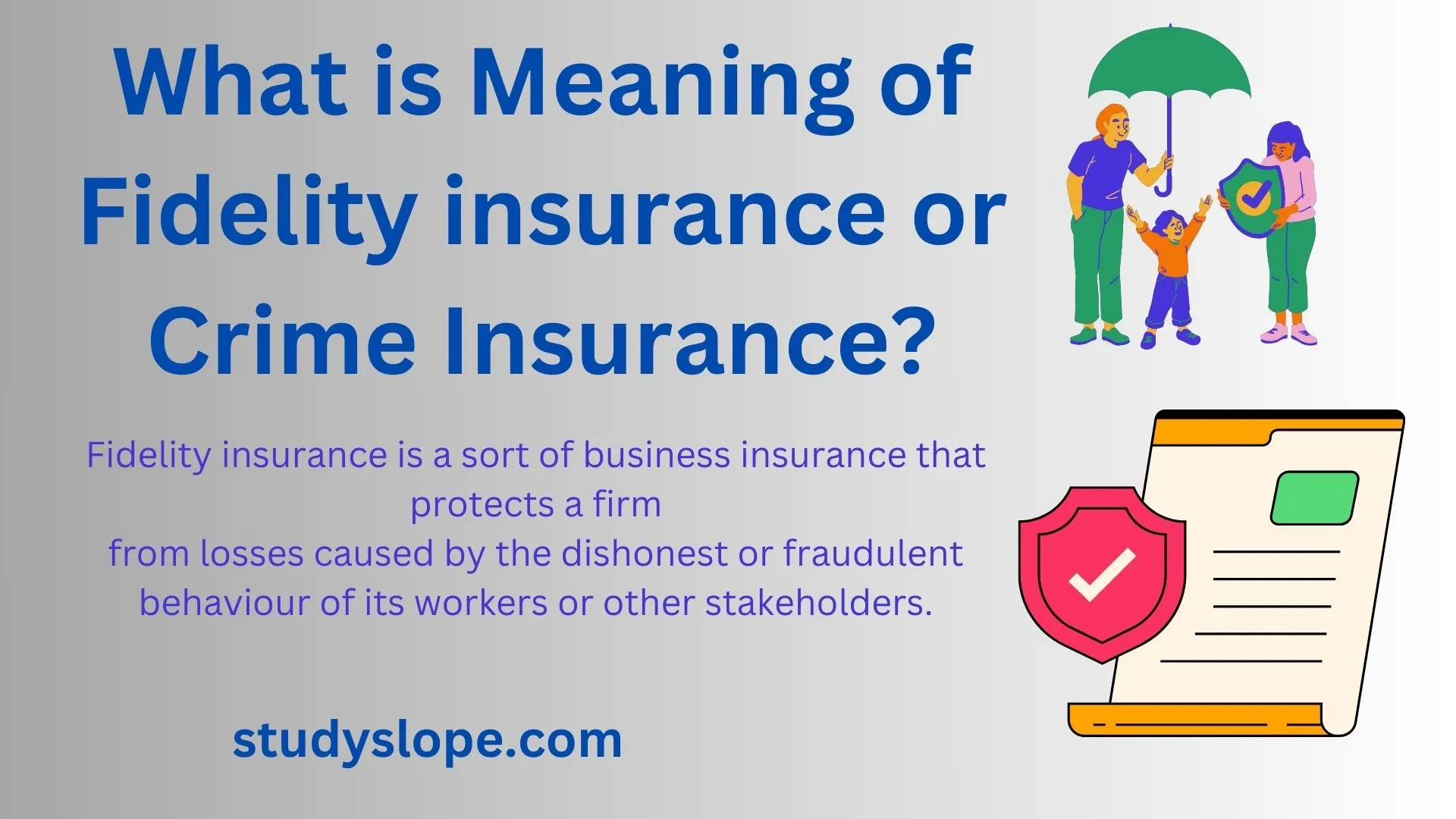What is Meaning of Fidelity insurance or Crime Insurance?
Fidelity insurance is a sort of business insurance that protects a firm from losses caused by the dishonest or fraudulent behaviour of its workers or other stakeholders. It is also called ‘Crime Insurance’ or ‘Commercial Crime Insurance’. This sort of insurance can protect against theft, embezzlement, and forgeries. Companies can get this insurance to protect themselves from financial losses caused by unlawful behaviour performed by employees, vendors, customers, or other third parties for whom the firm is held accountable.
Lets take an example a company name Shire Plumbing has sent a plumber to repair a bathroom of a customer name Kayo. But the plumber ended up stealing some cash as well as jewellery from Kayo’s home and the company Shire Plumbing is held liable for the theft. This in this case fidelity insurance can provide protection for Shire Plumbing business against the loss, damage, and expenses, arising from the claim or lawsuit from the customer Kayo.
What all are covered by Fidelity Insurance?
Fidelity insurance, also referred to as employee dishonesty insurance or crime insurance, generally provides coverage for various losses caused by fraudulent actions carried out by employees. The coverage of fidelity insurance can vary depending on the policy and insurer. However, there are common elements that are usually covered by this type of insurance.
Employee dishonesty:
Provides protection against damages caused by workers’ fraudulent or dishonest activities. This includes theft, embezzlement, forgeries, and any other purposeful activities that cause financial loss to the company.
Theft of cash or property: Losses caused by the theft of money, securities, or other property owned by the insured firm are covered. This may involve theft from cash registers, safes, or other protected facilities.
Forgery or alterations: Crime insurance often covers losses caused by the forging or modification of financial instruments such as checks, promissory notes, or other negotiable instruments.
Fraudulent Fund Transfers: If an employee participates in illegal financial transfer activities, such as making unlawful electronic transactions or diverting funds, crime insurance can provide coverage.
Credit Card Fraud: It may cover losses caused by credit card fraud or illegal credit card use by employees.
Computer and Electronic Crimes: It may cover damages resulting from computer-related crimes like as hacking, identity theft, or unlawful access to personal information.
Customer Theft: Some insurance may cover the theft or misappropriation of funds or property belonging to customers.
Legal and investigative costs: It can cover the costs of investigating employee dishonesty, such as legal bills, forensic accounting, and other charges incurred in assessing the scope of the loss.
Court Ordered Judgments:
If the company is judged legally responsible for losses caused by employee dishonesty, fidelity insurance may pay court-ordered judgments or settlements.
Extortion or kidnap/ransom: Some insurance may cover damages resulting from extortion or kidnapping/ransom incidents involving employees.
You may Like: 7 Principles of Insurance contract
What can be excluded from Fidelity Insurance?
Commercial crime insurance cannot be claimed under specific situations that are mentioned as exclusions in the standard company insurance policy.
Employees who do dishonest activities outside of their work obligations may be banned from fidelity insurance coverage.
Losses caused by dishonest activities that were known to the organization or policyholder before acquiring fidelity insurance may be excluded.
Employees who conduct acts of dishonesty purely for personal financial gain and do not help the corporation may not be protected.
This insurance may not cover losses caused by unlawful transactions or activities that are not allowed by the employer.
It may not cover dishonest activities perpetrated by non-employees, such as clients or vendors.
It may not cover employee benefits-related losses, such as healthcare theft or pension fund misappropriation.
Losses without sufficient paperwork or proof to support the claim may be rejected from coverage.
Crime insurance is primarily intended to cover financial losses and may exclude non-financial damages.
Who needs Fidelity Insurance?
Fidelity insurance is important for a wide range of businesses and organizations, including small businesses, vendors, financial institutions, professional service firms, nonprofits, government agencies, healthcare providers, colleges and universities, manufacturing companies, hospitality businesses, technology firms, and any organization with employees.
It protects against financial losses caused by dishonest activities perpetrated by personnel, such as theft, embezzlement, or fraud. Fidelity insurance is a complete risk management solution that protects organizations’ financial integrity in a variety of industries.
Conclusion
Finally, Fidelity Insurance is an important safeguard against the financial risks associated with employee dishonesty. While providing significant coverage for a variety of circumstances, policyholders should be mindful of the exclusions. Understanding what is excluded from Fidelity Insurance ensures reasonable expectations and enables firms to apply extra risk management techniques as needed. Regular monitoring of policy terms, effective contact with insurers, and strict internal controls all help to maximise the benefits of Fidelity Insurance.
FAQs
What is fidelity insurance?
Fidelity insurance reimburses the insured professional for a loss caused directly by their staff’ dishonest activities. it protects organizations against the costs associated with employee forgery, defalcation, embezzlement, and other fraudulent crimes.
What Does Fidelity Insurance Cover?
A Fidelity Insurance coverage protects employers against losses caused by forgery, fraud, or dishonesty on the part of their employees. The loss may be in the form of money or products for the length of the policy.
Do You Need Fidelity Insurance?
Certain factors will determine whether or not this Insurance is a good protection for your business, such as:
The employee’s record, standing, and reputation
Employer’s “bonafide”
The existing systems for auditing accounts
Effective supervision of the employee


1 thought on “What is Fidelity Insurance?”
Comments are closed.